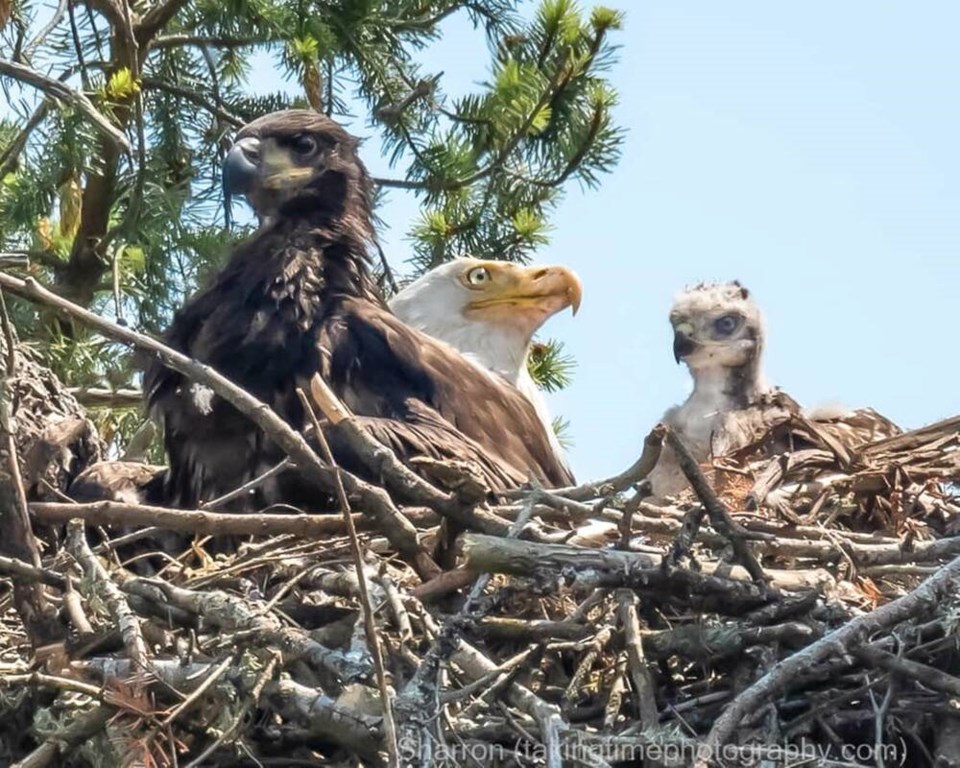Fans of an unusual raptor family that captured the hearts of people around the world are mourning the loss of Junior, a Gabriola Island eaglet killed when he attempted to land near or on a B.C. Hydro transformer.
The young eagle’s body was found with his wings spread and a noticeable exit wound under one of his wings, said Pam McCartney, dispatch officer for the Gabriola Rescue of Wildlife Society (GROWLS). He likely died immediately when he tried to land on the high voltage box, she said.
“He would have taken a really beautiful, big soar,” McCartney said through tears. “It really makes me happy that his final flight, he was soaring free. And that’s what he would have been doing for the rest of his life.”
Junior, who was less than three months old, was part of a blended family that rose to internet fame thanks to an unusual relationship captured on a GROWLS nest-cam.
McCartney was home sick watching the livefeed on June 4 when she saw the eaglet’s mother bring something big and fluffy to the nest — as a meal.
“She jumped into the nest and let go of it and it came alive. It stretched its wings. And I thought, ‘Oh no, I can’t believe this is going to happen.’ ”
But instead of carnage, the two young birds started huddling together for warmth. By the next day, the mother was feeding both of them, and the new addition — eventually determined to be a red-tailed hawk — was officially part of the family.
“There was full acceptance for this being that doesn’t necessarily belong with them but they’ve brought it in and accepted it and loved it,” McCartney said. “The relationship the hawk and the eaglet had together — it was beautiful, it was so adorable. They did everything together. They practised flight together, flapping their wings in the nest, playing with sticks.”
The live video footage of the nest drew so much web traffic that the GROWLS server started crashing, and the livefeed had to be moved to YouTube.
“We had no idea what an incredible draw it would be to so many other people,” McCartney said. “It was just something for our little community to watch and learn and grow from.
“We connect with nature and we all are the same, whether we want to believe it or not … I think when we see something like that, it pulls at your heart and makes you have hope and faith for goodness.”
Junior’s death was preventable, McCartney said. In fact, an eaglet from the same nest succumbed to the same fate at in 2018. GROWLS was in talks with B.C. Hydro just this spring about protective measures, such as perches and bird diverters, but nothing has been put in place.
On Gabriola Island, five birds are known to have been killed by electrocution just this year. The birds are found with small entry wounds and larger, devastating exit wounds.
Most run-ins are fatal, said Martina Versteeg, a raptor care supervisor at OWL, a Delta-based non-profit dedicated to rescuing, rehabilitating and releasing raptors in B.C.
Versteeg said some birds who come into contact with wires survive with flash burns and can be rehabilitated, but most will die.
“Every case varies because voltage varies,” she said. “Most of them do end up perishing even with treatment.”
OWL worked with B.C. Hydro a few years ago, and Versteeg said the number of birds killed by lines was reduced significantly after perches and diverters were added to poles in the Delta area.
“We’re hoping to see this type of change be put in place across B.C. and beyond, and hopefully used more for every pole that’s put in and installed,” she said. “Even just putting the perch on and diverters, it makes a difference.”
A B.C. Hydro representative said the Crown corporation does its best to mitigate contact between wildlife and its equipment. In 2018, B.C. Hydro said animals cause about five per cent of all outages.
“Because this does happen, we’ve been putting a lot of effort in to try to mitigate it across the province,” said Ted Olynyk, community relations manager. B.C. Hydro works with wildlife agencies across B.C. to identify high-risk areas, he added.
“We do our best to try and deal with it. Unfortunately the timing wasn’t good here,” he said. “We are in the middle of trying to find measures for that location to work to divert birds.”




